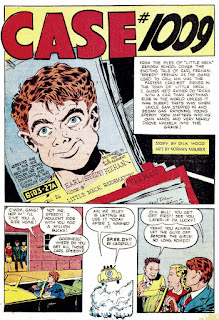The story, written by Dick Wood and drawn by Norman Maurer, is more cautionary tale than crime story. Certainly Speedy gets his punishment at the end, but his thefts are represented more as youthful folly than actual crimes. Maybe the attitude toward taking someone else’s car without permission was different in 1942 than it is in 2016. Nowadays he would probably get a lot more than six months in reform school for the same crime. I also hope George Anderson of Naval Intelligence got some form of censure or punishment from his superiors for being stupid, leaving secret defense plans in his car while spending the night in a hotel.
Translate
Monday, July 18, 2016
Number 1920: Joyriding with Speedy
“Case 1009” is the last of a series of one-shot crime stories that appeared in Boy Comics, from the first issue (#3) to #10 (1942), which is where we take our tale of young Earl “Speedy” Feehan. Speedy loves cars. He loves them so much he steals borrows them and hot-rods around his home town. He thinks this sort of activity is okay — it’s just for kicks, y'know — but then he boosts the wrong car. He steals some classified war files left in a car by a government guy, and Speedy is confused for a Nazi spy.
The story, written by Dick Wood and drawn by Norman Maurer, is more cautionary tale than crime story. Certainly Speedy gets his punishment at the end, but his thefts are represented more as youthful folly than actual crimes. Maybe the attitude toward taking someone else’s car without permission was different in 1942 than it is in 2016. Nowadays he would probably get a lot more than six months in reform school for the same crime. I also hope George Anderson of Naval Intelligence got some form of censure or punishment from his superiors for being stupid, leaving secret defense plans in his car while spending the night in a hotel.
The story, written by Dick Wood and drawn by Norman Maurer, is more cautionary tale than crime story. Certainly Speedy gets his punishment at the end, but his thefts are represented more as youthful folly than actual crimes. Maybe the attitude toward taking someone else’s car without permission was different in 1942 than it is in 2016. Nowadays he would probably get a lot more than six months in reform school for the same crime. I also hope George Anderson of Naval Intelligence got some form of censure or punishment from his superiors for being stupid, leaving secret defense plans in his car while spending the night in a hotel.
Labels:
Boy comics,
Dick Wood,
Norman Maurer
Subscribe to:
Post Comments (Atom)







5 comments:
After serving his six months in the reformatory, Speedy was recruited by fifth columnists as a wheelman. When he was finally caught and sent away for life, he annoyed the other inmates by constantly muttering, "I didn't mean nothin'."
First of all, Pappy, let me offer you my most heartfelt congratulations for the Anniversary of your blog (yes, I'm awfully late for this, but I've been quite busy with some not-so-pleasant matters in the last few days, thus I was in a not so pleasant mood).
Like the most precious wine, or a luxurious Persian carpet, your excellent choice of stories and your brilliant and profound introductory notes, can only improve with the passing of time.
Har-Rumph!... Anyway... How young do you think young Feehan (Irish name?) exactly is? I presume he's a minor, otherwise he would probably have been enlisted in 1943. So, my guess is this was his first offence, and that's why they sent him to the Juvie for 6 months. He looks more or less like a 14-16 kid to me. And a not too bright one at that, judging by the "snapshot" in the splash-page.
Keep up the good work, Old Fanzinaro.
J D, I hope your situation has improved, and that is why you can find time to write.
I assume Speedy is about 16...most states issue driver's licenses to those who have attained that age (and can pass the test, both written and driving). What?! Cut him slack on a first offense? Throw him in the clink and throw the key to the hogs!
Ryan, I have it on good authority that despite his life sentence he got out early. He moved to Kentucky and ran moonshine, then got into stockcar racing
J.D.'s ethnic conjecture is reasonable; certainly one origin of “Feehan” is Irish, though there are odd convergences in this world.
When my father was a teenager, living in Missouri, its state issued licenses for motorscooters at a younger age than for automobiles, but the issued cards were identical. So, well, yeah, Dad drove cars at an early age, th' punk.
Feehan doesn't simply take a car for a joyride; he ends-up putting it in the drink. Now, it might be argued that trigger-happy cops were largely responsible for that, but I don't think that the government were any better admitting culpability in wartime than it is these days. If we consider what happened to George John Dasch and to Ernest Peter Burger (German spies who almost immediately defected), then it a six-month sentence for Feehan seems implausible.
Post a Comment